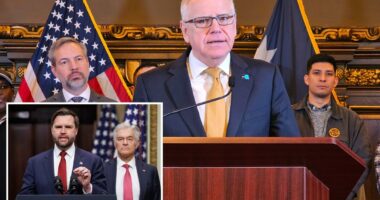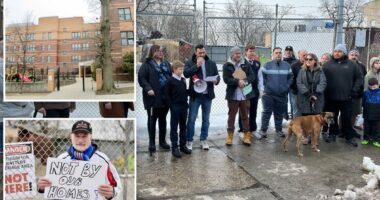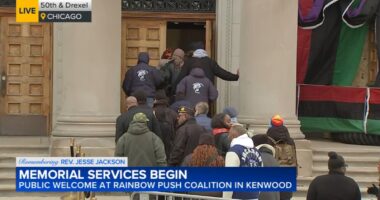Share this @internewscast.com
WASHINGTON — In a notable move, former President Donald Trump has granted a second pardon to a January 6 participant who remained incarcerated due to a separate illegal firearms conviction, despite previous clemency for many Capitol riot offenders.
This act underscores Trump’s readiness to exercise his presidential powers to support individuals who backed him during the tumultuous period following his 2020 electoral defeat to President Joe Biden.
The individual at the center of this case, Daniel Edwin Wilson from Louisville, Kentucky, was being investigated for his involvement in the Capitol incident when authorities discovered six guns and approximately 4,800 rounds of ammunition at his residence. Given his prior felony record, Wilson’s possession of these firearms was unlawful.
The situation has fueled a legal debate on whether Trump’s pardons for January 6 participants extend to other unrelated offenses uncovered during the extensive federal investigations that followed the Capitol attack. Earlier this year, a federal judge appointed by Trump criticized the Justice Department for contending that the January 6 pardons should cover Wilson’s gun-related charges.
Originally slated to remain imprisoned until 2028, Wilson was released on Friday evening after receiving the pardon, his attorney confirmed on Saturday.
“We are thankful that President Trump has acknowledged the unfairness in my client’s situation and has provided him with this pardon,” stated attorney George Pallas in an email. “Mr. Wilson now has the opportunity to reunite with his family and start rebuilding his life.”
A White House official said Saturday that “because the search of Mr. Wilson’s home was due to the events of January 6, and they should have never been there in the first place, President Trump is pardoning Mr. Wilson for the firearm issues.” The official requested anonymity because they weren’t authorized to publicly discuss the case.
Wilson had been sentenced in 2024 to five years in prison after pleading guilty to conspiring to impede or injure police officers and illegally possessing firearms at his home.
Prosecutors had accused him of planning for the Jan. 6 riot for weeks and coming to Washington with the goal of stopping the peaceful transfer of power. Authorities said he communicated with members of the far-right Oath Keepers extremist group and adherents of the antigovernment Three Percenters movement as he marched to the Capitol.
Prosecutors cited messages they argued showed that Wilson’s “plans were for a broader American civil war.” In one message on Nov. 9, 2020, he wrote: “I’m willing to do whatever. Done made up my mind. I understand the tip of the spear will not be easy. I’m willing to sacrifice myself if necessary. Whether it means prison or death.”
Wilson said at his sentencing that he regretted entering the Capitol that day but “got involved with good intentions.”
The Justice Department had initially argued in February that Trump’s pardons of the Jan. 6 rioters on his first day back in the White House didn’t extend to Wilson’s gun crime. The department later changed its position, saying it had received “further clarity on the intent of the Presidential Pardon.”
U.S. District Judge Dabney Friedrich, who was nominated to the bench by Trump, criticized the department’s evolving position and said it was “extraordinary” that prosecutors were seeking to argue that Trump’s Jan. 6 pardons extended to illegal “contraband” found by investigators during searches related to the Jan. 6 cases.
Politico first reported Wilson’s pardon on Saturday. Megerian reported from West Palm Beach, Fla.
.

















